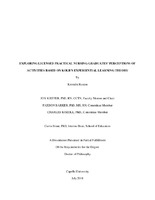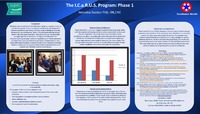Exploring licensed practical nursing graduates' perceptions of activities based on Kolb's Experiential Learning Theory
View File(s)
- Author(s)
- Details
-
Keondra Rustan, PhD, RN, Eisenhower Health, Palm Desert, California, USA
- Sigma Affiliation
- Xi Mu
Visitor Statistics
Visits vs Downloads
Visitors - World Map
Top Visiting Countries
| Country | Visits |
|---|
Top Visiting Cities
| City | Visits |
|---|
Visits (last 6 months)
Downloads (last 6 months)
Popular Works for Rustan, Keondra by View
| Title | Page Views |
|---|
Popular Works for Rustan, Keondra by Download
| Title | Downloads |
|---|
View Citations
Citations
Experiential learning strategies have proven to beneficial in educating Registered Nurses (RNs) at the baccalaureate degree level. However, there is a great limitation on the amount of research available regarding the use of these techniques with licensed practical nursing (LPN) students. There is a need to examine these educational techniques on LPN students as they make up a large percentage of the health care workforce and care for a vulnerable part of the United States population. The purpose of this basic qualitative study was to explore the experiences of LPN graduates with experiential learning strategies, and determine if experiential learning strategies enhanced their preparedness for their transition from student to practitioner and critical-thinking skills in the clinical setting upon graduation. Data were collected using semistructured, open-ended interview questions. The sample included LPN graduates who had experience with experiential learning strategies in their degree programs. The interviews were audio-recorded and transcribed. The data entered into Atlas.ti, software was analyzed and coded. The results of the study revealed that experiential learning strategies were reported to be beneficial for these LPNs by increasing confidence and improving critical skills and critical thinking. The participants stated that they were also able to apply what they learned from the experiential learning strategies to their clinical practice. Future research is needed to determine if experiential learning strategies are being utilized in LPN programs to maximize these reported positive outcomes.
This dissertation has also been disseminated through the ProQuest Dissertations and Theses database. Dissertation/thesis number: 10840508; ProQuest document ID: 2086443542. The author still retains copyright.
This item has not gone through this repository's peer-review process, but has been accepted by the indicated university or college in partial fulfillment of the requirements for the specified degree.
| Type | Dissertation |
| Acquisition | Proxy-submission |
| Review Type | None: Degree-based Submission |
| Format | Text-based Document |
| Evidence Level | Case Study/Series |
| Research Approach | Qualitative Research |
| Keywords | Experiential Learning; LPN Students; Critical Skills |
| CINAHL Subject(s) | Adult Education; Education |
| Grantor | Capella University |
| Advisor | Kieffer, Joy |
| Level | PhD |
| Year | 2018 |
All rights reserved by the author(s) and/or publisher(s) listed in this item record unless relinquished in whole or part by a rights notation or a Creative Commons License present in this item record.
All permission requests should be directed accordingly and not to the Sigma Repository.
All submitting authors or publishers have affirmed that when using material in their work where they do not own copyright, they have obtained permission of the copyright holder prior to submission and the rights holder has been acknowledged as necessary.
Related items
Showing items related by title, author, creator and subjects.
-
One and done? How much exposure to experiential learning strategies is enough?
Rustan, KeondraHow do we know that we have shown a student or clinician how to properly perform a task? How do we know that learning has taken place? How many steps are too many? This presentation will discuss the view from the learners' ... -
Using Kolb's Experiential Learning Model to develop undergraduate student informal nursing leadership
Greeno, Sandra L.; Hooke, Sherrill L. (2018-06-07)Undergraduate nursing students need to learn to be informal leaders to positively impact patient/client healthcare. This presentation will describe using Kolb's Experiential Learning Model to teach an integrated theory and ... -
The I.C.a.R.U.S. Program: Phase 1
Rustan, KeondraHow can we improve communication at the start of the nurse-physician relationship? Is there a way to start role delineation and communication excellence at the beginning? The participants who view this poster will learn ... -
An evaluation of knowledge, skills, and attitudes toward evidence-based practice in on-line graduate nursing students
Rojjanasrirat, Wilaiporn (2016-03-21)Session presented on Monday, November 9, 2015 and Tuesday, November 10, 2015: Background: Evidence-based practice (EBP) is an essential element in driving health care delivery and practice. The need to create a culture ... -
Nursing students' perceptions and attitudes towards evidence-based practice, research and graduate education in nursing
Ayoola, Adejoke B. (2016-07-13)Session presented on Sunday, July 24, 2016: Purpose: Part of the roles of nurses identified in 'The Future of Nursing: Leading Change, Advancing Health' report released in 2010 by the Institute of Medicine (IOM) and Robert ...





